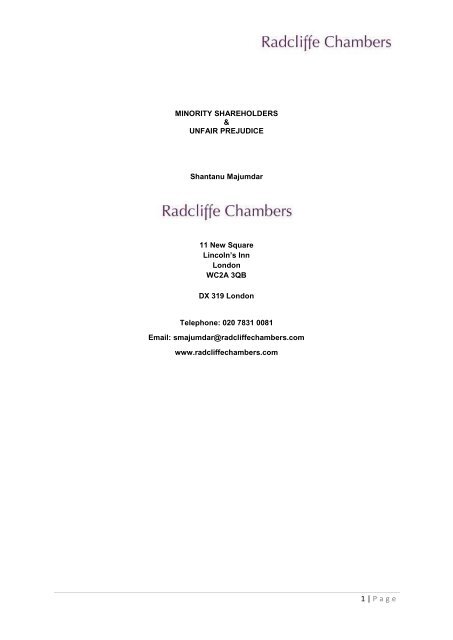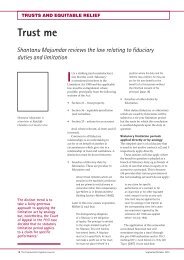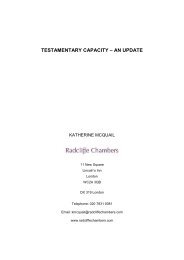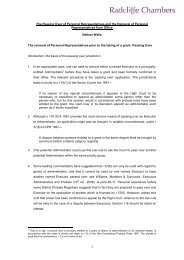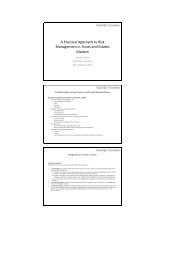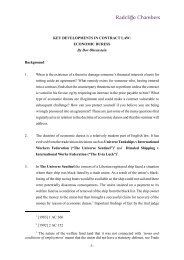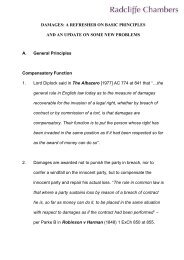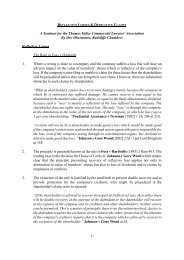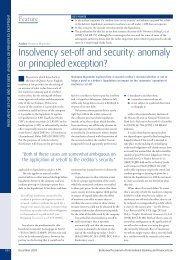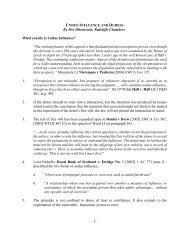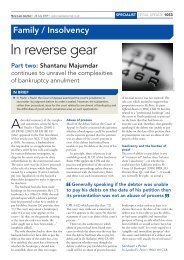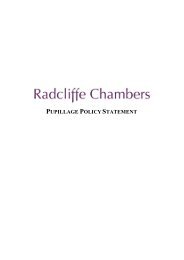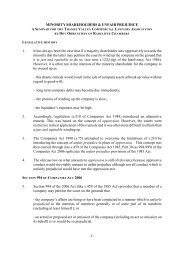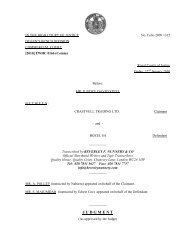1 | Page - Radcliffe Chambers
1 | Page - Radcliffe Chambers
1 | Page - Radcliffe Chambers
Create successful ePaper yourself
Turn your PDF publications into a flip-book with our unique Google optimized e-Paper software.
MINORITY SHAREHOLDERS&UNFAIR PREJUDICEShantanu Majumdar11 New SquareLincoln’s InnLondonWC2A 3QBDX 319 LondonTelephone: 020 7831 0081Email: smajumdar@radcliffechambers.comwww.radcliffechambers.com1 | P a g e
MINORITY SHAREHOLDERS & UNFAIR PREJUDICELEGISLATIVE HISTORY1. Where a majority shareholder acts oppressively towards the minority then the minority haslong been able to petition the court to wind up the company on the ground that it is just andequitable to do so, (see now s.122(1)(g) of the Insolvency Act 1986).2. However, it may not be in the interests of the minority shareholder for the company to bewound up:- the remedy is drastic and may result in the sale of company assets at break-up valuewithout regard to good-will;- long term company debts may become due immediately;- the winding-up process is slow; and- liquidation expenses are likely to be high.3. Accordingly, s 210 of Companies Act 1948 introduced an alternative remedy. This was basedon the concept of oppression but was applying restrictively by the courts and was thereforeoften more difficult to obtain than a just and equitable winding up.4. Section 75 of the Companies Act 1980 sought to overcome the limitations of s 210 byintroducing the concept of unfair prejudice in place of oppression; this jurisdiction waspreserved in s 459 of the Companies Act 1985 and Part 30 (ss 994-999) of the CompaniesAct 2006 replicates the unfair prejudice provisions of the 1985 Act.5. The old case law on what amounts to oppression remains relevant because oppressiveconduct inevitably amounts to unfair prejudice although not all conduct which is unfairlyprejudicial would have met the oppression test.SECTION 994 COMPANIES ACT 20066. Section 994 of the 2006 Act (like s 459 of the 1985 Act) provides that a member of a companymay petition the court on the grounds that2 | P a g e
a. It can therefore apply where there are shareholders with equal holdings.b. In those rare cases where there is minority shareholder control then the majorityshareholder could petition. 8o However, the court will not grant a majority shareholder a remedy under s.994where the prejudice can be avoided by the exercise of his rights as majorityshareholder. 9INTERESTS OF PETITIONERS AS MEMBERS12. For a petition to succeed the affairs of the company must be conducted in a way which isunfairly prejudicial to the interests of some/ all members including the petitioner’s owninterests.13. The conduct need not impact on the interests of petitioners in their capacity as members solong as it is sufficiently connected with membership, eg the exclusion of a member from theboard of directors. 10oIt has been held that a petitioner did have a legitimate interest as member in becoming orremaining as non-executive chairman of a small company in order to protect the capitalcontributions he had made to the enterprise, including capital contributions made by wayof loans. 1114. Moreover, in Gamlestaden Fastigheter AB v Baltic Partners 12 , the Privy Council held thatalthough the unfair prejudice must affect someone in his/her capacity as a member, there isno requirement that the relief granted must benefit that person in that capacity but merely insome capacity. It was therefore appropriate on the facts of that case – joint venturersproviding working capital to the company by means of loans – to grant relief to the petitionerwhich would benefit it in its capacity as creditor. (Cf the probably wrongly decided case of JECade & Son Ltd [1992] BCLC 213 – where a lease of land by the member was held not to besufficiently connected with the petitioner’s membership.)15. But section 994 cannot be used to protect absolutely any interest of a petitioner who happensto be a member, for example:8 Re Ravenhart Service (Holdings) Ltd [2004] 2 BCLC 3769 Re Baltic Real Estate [1993] BCLC 50310 Re a Company [1986] BCLC 37611 Tay Bok Choon v Tahansan Sdn Bhd [1987] 1 WLR 413 PC12[2008] 1 BCLC 468.4 | P a g e
a. Where there is in substance an employment dispute but the employee also happensto own a few shares.b. Where the petitioner’s interests are adverse to those of the company.oSo where the petitioner was the freeholder of land leased to the company whichhad security of tenure under the Agricultural Holdings Act 1986, the court refusedto order possession of the land under s.994. 13PARENT AND SUBSIDIARY COMPANIES16. Section 994 only applies where the affairs of the company are being conducted in a mannerwhich is unfairly prejudicial. The section does not apply where another shareholder, even amajority shareholder, is conducting its own affairs in a manner which is prejudicial to thepetitioner.17. But it all depends on the facts and where a parent company has close control over the affairsof a subsidiary and treats the financial affairs of the two companies as that of a singleenterprise, actions taken by the parent in its own interest may be considered to be acts donein the conduct of the affairs of the subsidiary. 1418. Further, conduct of the affairs of a subsidiary may be conduct of the affairs of the parent egwhere the directors of the parent represent the majority of the directors of the subsidiary. 15THE NATURE OF UNFAIR PREJUDICE19. Ordinarily there will be no entitlement to complain of unfairness under s.994 if there has beenno“breach of the terms on which the [petitioner] has agreed that the affairs of thecompany should be conducted” 16Objective Test20. The test for unfair prejudice is objective not subjective and although motive may be relevant itis not a requirement, thus:13 Re JE Cade & Son [1992] BCLC 213.14 Nicholas v Soundcraft Electronics [1993] BCLC 360 CA.15 Gross v Rackind, Re Citybranch Group Ltd [2005] BCC 11 CA16 Re Saul D Harrison & Sons Plc [1995] 1 BCLC 145 | P a g e
“... it is not necessary for the petitioner to show that the persons who have de factocontrol of the company have acted as they did in the conscious knowledge that thiswas unfair to the petitioner or that they were acting in bad faith; the test, I think, iswhether a reasonable bystander observing the consequences of their conduct, wouldregard it as having unfairly prejudiced the petitioner’s interests.” 17Unfairness & Prejudice – Distinct Requirements21. The words “unfairly prejudicial” are general rather than technical and are applied flexibly tomeet the circumstances of the case.22. However, prejudice and unfairness are distinct and conjunctive requirements. Thusa. The mere fact that respondents have caused prejudice to the petitioner does notalways mean that there has been unfairness. So where two companies were alwaysrun as a single unit in disregard of the constitutional formalities of both of them butwith the acquiescence and knowledge of the petitioners there was prejudice but nounfairness. 18b. Conversely, reprehensible conduct by those in control of a company may be unfair(and indeed otherwise wrongful) but not prejudicial.oSo where directors entered into transactions pursuant to which (despite obviousconflicts of interest) they purchased company assets, this was unfair but no s.994remedy was granted as the price paid by the directors was not less than thecompany would have obtained from an arm’s length purchaser. 19The need for substantial prejudice23. The relevant prejudice must be commensurate with the remedy sought by the petitioner.24. In particular, a respondent will not be required to buy out the petitioner’s shares at a fair priceif the prejudice is relatively trivial and the petitioner has already accepted the role of a passiveinvestor. 2025. It has been held that in a quasi partnership company a justifiable loss of confidence by thepetitioner in the other quasi partner which leads to a breakdown in the relationship may17 Re Bovey Hotel Ventures Ltd (unreported) quoted with approval in RA Noble &Sons Clothing Ltd [1983] BCLC 273 at 290.18 Jesner v Jarrod Properties [1992] BCC 80719 Rock Nominees Ltd v RCO (Holdings) Ltd [2004] 1 BCLC 439 CA20 Re Metropolis Motorcycles Ltd [2005] 1 BCLC 5206 | P a g e
amount to sufficient prejudice even if there is nothing more tangible by way of prejudice 21 , buta mere breakdown of trust and confidence among quasi partners will not be a basis for asuccessful petition – the breakdown must relate to conduct which is unfair and prejudicial. 2226. Prejudice is harm in a commercial and not merely emotional sense but it is not necessary (orsometimes even sufficient) for the petitioner to show that the conduct complained of hascaused a loss in the value of the petitioner’s shares, this is neither a necessary nor sufficientbasis for a petition.a. not sufficient because conduct by the majority which is not unfair (eg commercialmisjudgement/incompetence) might itself cause a fall in the value of the shares.b. not necessary because the unfairness may consist purely in an exclusion from themanagement of the company. 23Legitimate Expectations27. The concept of legitimate expectations has been used to describe the types of interests thatmay be protected by a s.994 petition. 24 Members clearly have a legitimate expectation that acompany will be managed lawfully, ie in accordance with its articles and the duties owed byits directors. Beyond illegality, identifying legitimate expectations is a more difficult task.28. It has been said that“Section [994] enables the court to give full effect to the terms and understandings onwhich the members of the company become associated but not to rewrite them”. 2529. The existence of formal agreements does not necessarily prevent the existence of unwrittenunderstandings giving rise to legitimate expectations but it does reduce their likelihood. 2630. In larger companies a legitimate expectation based upon informal arrangementssupplementing the company articles will be difficult to establish and, even if established,unlikely to be given effect to by the courts. For example, in a case where a company wasquoted on the Unlisted Securities Market it was said:21 Re Baumler (UK) Ltd [2005] 1 BCLC 9222 Re Jayflex Construction Ltd [2004] 2 BCLC 14523 Re RA Noble & Sons (Clothing) Ltd [1993] BCLC 27324 Re a Company [1986] BCLC 376, per Hoffman J.25 Re Posgate and Denby (Agencies) Ltd [1987] BCLC 8 at 14.26 Re a Company (2015 of 1996) [1997] 2 BCLC 17 | P a g e
“Outside investors were entitled to assume that the whole of the constitution wascontained in the articles, read, of course, together with the Companies Acts. There isin these circumstances no room for any legitimate expectation founded on someagreement or arrangement made between the directors and kept up their sleeves andnot disclosed to those placing the shares with the public through the UnlistedSecurities Market.” 27Equitable considerations31. In the leading case of O’Neill v Phillips 28a. Lord Hoffman makes it clear that the principles as to unfairness which the courtapplies is essentially the same whether the remedy sought is just and equitablewinding up or under s 994. 29b. He commented on his earlier use of the phrase “legitimate expectations” and said itwas “probably a mistake” and that the phrase “should not be allowed to lead a life ofits own”.c. His concern was to make clear that s 994 petitions did not give the courts a generalpower to assess the fairness of the conduct of company controllers.d. He said that he preferred to use the phrase “equitable considerations” to describe thecircumstances when the courts should grant relief to petitioners.e. While this is a shift in judicial language it is not a change in the approach that courtswill take to s.994 petitions. Judges will continue to look at the history of therelationship between the parties and to require a promissory – but not strictlycontractual 30 – foundation to a complaint that legitimate expectations have not beenmet.32. Lord Hoffman’s starting point is that a member of a company will not ordinarily be entitled tocomplain of unfairness unless there has been some breach of the terms on which he agreed27 Re Blue Arrow [1987] BCLC 585 at 59028 [1999] 1 WLR 109229 Subject to the qualification that: ‘the parallel I have drawn… does not mean that conductwill not be unfair unless it would have justified an order to wind up the company’ and on thefacts in Re Neath Rugby (No 2) the Court of Appeal though that they were sufficient to justify ajust and equitable winding up but were not necessarily sufficient to give the court jurisdictionunder s 994.30 “Nor is it necessary that such promises should be independently enforceable as a matter ofcontract. A promise may be binding as a matter of justice and equity. Although for one reasonor another… it would not be enforceable in law.” Per Lord Hoffman.8 | P a g e
that the affairs of the company be conducted and these are of course primarily (and usuallyexclusively) to be found in the articles of association and any agreements made betweenshareholders.33. But‘In a quasi-partnership company, there will usually be understandings between themembers at the time they entered into the association. But there may be laterpromises, by words or conduct, which it would be unfair to allow a member to ignore.”34. This point derives of course from the earlier decision of the House of Lords in Ebrahimi vWestbourne Galleries Limited 31 :“The words ["just and equitable"] are a recognition of the fact that a limited companyis more than a mere legal entity, with a personality in law of its own: that there is roomin company law for recognition of the fact that behind it, or amongst it, there areindividuals, with rights, expectations and obligations inter se which are notnecessarily submerged in the company structure. That structure is defined by theCompanies Act and by the articles of association by which shareholders agree to bebound. In most companies and in most contexts, this definition is sufficient andexhaustive, equally so whether the company is large or small. The "just andequitable" provision does not, as the respondents suggest, entitle one party todisregard the obligation he assumes by entering a company, nor the court todispense him from it. It does, as equity always does, enable the court to subject theexercise of legal rights to equitable considerations; considerations, that is, of apersonal character arising between one individual and another, which may make itunjust, or inequitable, to insist on legal rights, or to exercise them in a particularway.” 3235. Unfairness is therefore to be judged“by testing whether, applying established equitable principles, the majority has acted,or is proposing to act, in a manner which equity would regard as contrary to goodfaith”. 33A petitioner will normally need to prove the existence of agreements, promises, orunderstandings, reached among the shareholders at the time the company was establishedor subsequently and, in either case, reliance on any such informal understandings. 34 Relianceat the time a company is established is likely to be easily established by the fact thatsomeone chooses to invest money/effort in the creation of a new business. Subsequentreliance may be harder to prove.31 [1973] AC 360.32 Per Lord Wilberforce at 379.33 Re Guidezone Ltd [2000] BCLC 321 at 35634 Ibid.9 | P a g e
EXAMPLES OF UNFAIRLY PREJUDICIAL CONDUCTMajority taking financial benefits from minority36. Where a majority shareholder arranges the company affairs so that he obtains unjustifiedfinancial benefits at the expense of the minority, eg by transferring to himself the businessand thus depriving the minority shareholder of a share of profits, this is a strong basis for a s994 petition. 35Exclusion from management37. In a small company a shareholder does not have an automatic right to be involved inmanagement issues. A breakdown in relations between members is an ordinary hazard ofbusiness and an insufficient basis for a petition. The House of Lords has rejected the use of s994 as form of corporate no fault divorce 36 so it is important for a petitioner to be able toestablish culpable conduct on the part of the respondent.38. Nevertheless in small quasi partnership companies there is often an informal agreement orarrangement that the shareholders will be involved in the management of the company and acommon basis for a successful petition is the removal of the petitioner from the board ofdirectors.Excessive remuneration/ derisory dividends39. Where a petitioner is no longer or never has been a director, a frequent cause of complaint isthat the directors are paid excessive remuneration resulting in a diminished (or no) dividend.No special rules apply in this scenario. Shareholders, even in small quasi partnershipcompanies, have no automatic right to expect dividends. 37 Specific additional circumstancesneed to be proven to satisfy the unfair prejudice test eg: an informal understanding that theprofits of the company would be distributed in a particular way. Also, where one party isactively involved in running a business it may be fair that that party receives a greater rewardthan a purely passive shareholder.Serious Mismanagement40. Commercial errors and even management incompetence are usually not a proper basis for apetition since these are considered to be part of the vicissitudes of commercial life. Seriousmismanagement by a controlling shareholder has however been held to be a basis for a35 Re London School of Electronics Ltd [1986] Ch 21136 O’Neill v Phillips [1999] 1 WLR 109237 Irvine v Irvine (No 1) 2007 BCLC 349 at 42110 | P a g e
successful s 994 petition. 38 What amounts to serious mismanagement as opposed to ordinarycommercial errors has not been adequately explained by the courts.41. Where mismanagement is of the self-serving variety, such as where assets are used for thepersonal benefit of a majority shareholder then that is a proper basis for a petition. 39Sale of shares at lower value42. A minority shareholder can be unfairly prejudiced by being prevented from selling his sharesto the highest bidder. 40Criminal Conduct43. The conduct of a company’s affairs by the majority in a criminal way can amount to unfairprejudice. 41REMEDIES44. Section 996 of the Companies Act 2006 provides that the court may make“such order as [the Court] thinks fit for giving relief in respect of the matterscomplained of”.45. The 2006 Act expressly sets out examples of potential remedies such as:a. Regulating the affairs of the company by either altering its constitution or forbiddingthe alteration of its constitution;b. Requiring the company to do or to refrain from doing an act such as the disposal ofan asset;.c. Authorising the bringing of proceedings in the name of or on behalf of the company(ie a derivative claim); andd. Ordering the purchase of some or all of the shares in the company.38 Re Macro (Ipswich) Ltd [1994] 2 BCLC 35439 Re Elgindata Ltd [1991] BCLC 95940 Re a Company (No 8699 of 1985) [1986] BCLC 38241 Bermuda Cablevision Ltd v Colica Trust Co Ltd [1998] AC 19811 | P a g e
46. Where a court orders the purchase of shares this usually involves the purchase of thepetitioner’s shares by the other shareholders. Valuation questions are often the focus of muchof the litigation.a. Minority shareholders can often expect their shares to be valued at a discount toreflect the lack of a controlling interest but this discount should not apply to quasipartnership companies. 42b. Where unfairly prejudicial conduct has damaged the value of a petitioner’s sharesthen a buy-out can be ordered based on historical valuations or on the hypotheticalbasis that such conduct has not occurred.47. Key points to note are that:a. The Court has a wide discretion as to remedies.b. The Court has to look at all the relevant circumstances when deciding what type oforder to make.c. It has been said that the appropriate remedy is one which would“put right and cure for the future the unfair prejudice which the petitioner hassuffered at the hands of the other shareholders of the company”. 43d. Nevertheless, the Court is not limited to reversing or putting right the immediateconduct which justified the making of the order. 44e. The prospective nature of the jurisdiction is reflected in the fact that the court mustassess the appropriateness of the remedy as at the date of the hearing and not as atthe date of the presentation of the petition and may even take into account conductwhich has occurred between those two dates. The Court is entitled to look at thereality and practicalities of the overall situation, past, present and future.Relationship with Derivative Claims48. So long as the petitioner seeks only personal relief (eg to be bought out), the use of s.994where the majority shareholder has acted in breach of duty to the company is not problematic.42 Irvine v Irvine (No 2) [2007] 1 BCLC 44543 Re Bird Precision Bellows Ltd [1986] Ch 658 at 66944 Grace v Biagioli [2006] BCC 8512 | P a g e
However, even if the petitioner also seeks corporate relief (eg it wants a derivative claim to bebrought) this can be achieved by s 994. 4549. Many petitions are founded on conduct which consists of wrongs done to the company wherethe petitioner is unable because of the rule in Foss v Harbottle and the prohibition on therecovery of shareholders’ reflective losses to bring a claim. In such circumstances a s 994Petition can be a useful alternative way to bring a derivative claim. While proceeding by s 994may avoid the formalities of a statutory derivative action, a petitioner should not expect thecourt to take a less vigorous approach to the question of whether or not a derivative claim isappropriate.50. In a case where a derivative action had been brought, a shareholder was given leave to joinan unfair prejudice petition to the derivative action but the derivative action was then stayed infavour of the petition since this enabled all the proceedings between the parties to be decidedat a single trial. 46 Such an approach is convenient where the petition is based in part onallegations of breach of duty on the part of the majority and in part on allegations of mereunfairness.PRACTICE AND PROCEDURE51. Relief under s 994 requires a petition otherwise it will be struck out. Failure to proceed bypetition is not a defect in procedure that can be remedied under the CPR. 4752. The company will often be named as a respondent alongside the majority shareholder. This isessential if some remedy is required against it such as a purchase of shares by the companyor the sale of a company asset. It may also be necessary to join all of the other shareholders.53. It is not necessarily appropriate for the majority shareholder to be represented by the samesolicitors as the company.54. Relief under s 994 is equitable and therefore not subject to any specific limitation period.However, the court is likely to refuse to grant relief if there is excessive delay. 4855. In appropriate cases, summary judgment or a strike-out may be available. Within thiscategory would be cases where a detailed shareholder agreement includes an entire45 Bhullar v Bhullar [2004] 2 BCLC 24146 Cooke v Cooke [1997] 2 BCLC 2847 Bamber v Eaton [2007] BCC 27248 Re Grandactual [2006] BCC 73, where relief was refused in respect of events 9 yearsbefore.13 | P a g e


